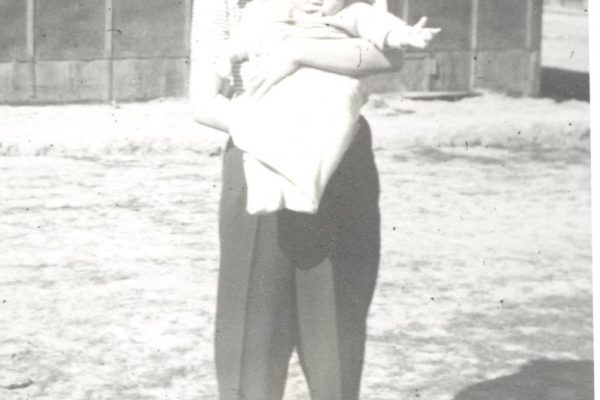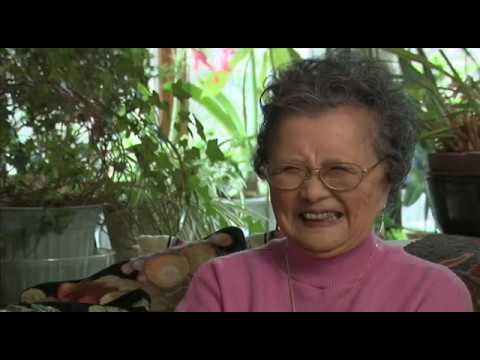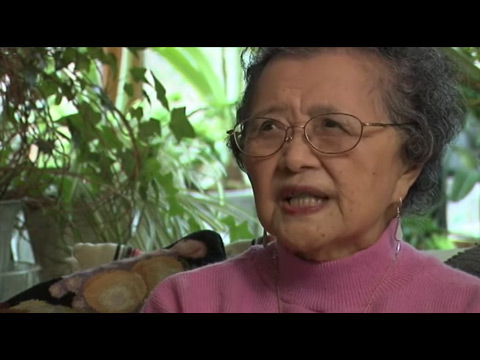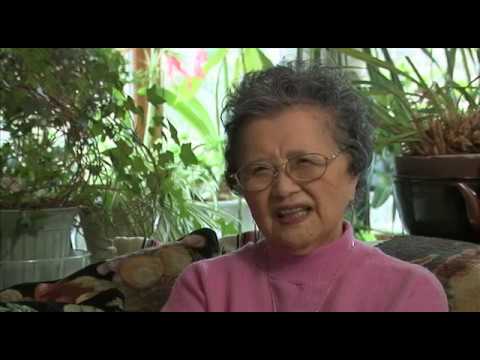Manzanar first days, basic facilities, cleaning house – Kay Nakao (OH0021)
Transcript
I don’t know if we slept very much or not, knowing we’re gonna be leaving the next day. And I can’t even remember eating or anything. All I can remember of that day is after we got dressed — and I’m sure we had breakfast — our friends came, Caucasian friends, classmates, and we hugged each other and cried. And oh, it was hard. They felt so badly for us. And then after it was all over, I don’t know what time it was, a big army convoy truck came and took different families, you know, on the truck, because we were not able to bring the car down to the Taylor Avenue — nobody to bring it back or anything — so the car was left at home, and we all rode on the convoy truck to Taylor Avenue. Then some of the school kids came, friends came down to say goodbye. Some of them even skipped school, and they were told not to, but they did, to say goodbye and see us leave. And as the ferry — it was a separate ferry, we could not go on the ferry that the usual commuters went on, we went from Taylor Avenue. And it, I can’t even describe the feeling as the ferry departed, and you got farther and farther away from the island. Oh… it’s hard to describe that feeling, it was so lonely, because usually when you go someplace, you know where you’re going, but we didn’t know, so it just made it worse.
And then after we arrived in Seattle, all these people on the viaduct and near the train track. Lots of people were curious, and there were lots of friends, I’m sure, and relatives of the Bainbridge Islanders. But the place was packed with people. First time such a thing ever happened, so I’m sure that many people were very curious. And then we boarded the train, and the windows were all black curtains down, so you know, all that train ride, we couldn’t even enjoy the scenery because we had to keep the, like a blackout, just keep it, the black curtains down. They kept saying, “It’s for your safety.”
We were on the train until we got to someplace in California, I can’t remember exactly where we transferred to a bus, because the train will not, couldn’t go any further, no tracks. So we all transferred, and I don’t know how many busloads. Then as we kept going, it got warmer and warmer and warmer. And we still didn’t know where we were at. And I could see from the, from the front, the window, where the bus, you know, the bus driver has to see. Through there I could see, way out yonder in the desert, all these barracks, and some men without their shirts on ’cause it was so hot. And they’re brown, I didn’t even know they were Japanese, they were so brown. And you could see the heat waves. And I said to the person sitting next to me, I says, “Oh, I’m sure glad I don’t live in a place like that.” And what do you know? After a while — I don’t know how long it took after I said that — the bus turned right in there. And I’m telling you, my heart sank down to my toes. I was just devastated. I said, “Oh, this desert.” Because, you know, when you go from this island where you have the water, the mountains and the green trees and everything, and then you’re in the desert and the heat and just all those desert plants, oh, couldn’t even describe it. Then they gave us this bag and said we had to fill it up for a mattress with straws. Of course, we had the army cots and then army khaki blanket and all this stuff.





